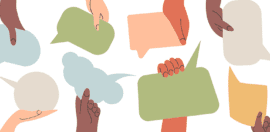Community-driven gathering pushes to decolonise Australia’s philanthropy

11 May 2022 at 4:37 pm
“You can’t write the way we share our culture and do our business in community. You can’t put that on paper. Sometimes it just needs to be a physical, cultural experience.”
A unique gathering took place last week as charitable trusts and foundation leaders sat down on-Country with First Nations people to speak about how to decolonise philanthropy.
It’s something that many people may not have considered before: but of Australia’s $942 million annual philanthropic funding pool, only a small fraction flows to First Nations organisations, according to NGO Woor-Dungin.
Woor-Dungin is a coalition of Aboriginal and Torres Strait Islander community-controlled organisations, philanthropic foundations and donors, and pro bono service providers who work together on self-determination for First Nations people by increasing access to resources and assistance. The name Woor-Dungin means “share” in the Gunaikurnai language and reflects the philosophy underpinning the coalition.
Woor-Dungin invited representatives of philanthropic trusts, Philanthropy Australia and Aboriginal Community Controlled Organisations from around the country for four days of sharing stories, songs and dances, and knowledge on Wurundjeri country in Healesville, Victoria.
Wakka Wakka Murri woman and Woor-Dungin chair Naomi Murphy told Pro Bono News that the gathering on-Country was unique, in that it was born of conversations held with Aboriginal communities across Victoria – meaning it was very community-driven.
Holding the meeting on-Country was vital for its success and power, Murphy said.
“It’s culturally appropriate. It makes it for Aboriginal people. That has been our way for over 60,000 years – just sitting on-country and listening, sitting amongst nature, sitting amongst our people and… listening and connecting with the elements,” she explained.
“We want philanthropy to meet us halfway, meaning meeting… us on-Country so they can get a sense of how we do business, because everything we do has community at the centre of it.”
Those invited on-Country were being invited into this space of comfort and cultural safety. First Nations people, Murphy said, shared stories both of trauma and goodness. But she said ultimately they felt listened to – and most importantly, everyone had something to share.
Murphy said representatives from philanthropic organisations told the gathering that they knew they needed to change their systems to make them more accessible for First Nations people.
But, she stressed, the gathering wasn’t about pointing fingers; it was about educating and learning from the stories being shared and from past mistakes. At its heart, this event was about truth-telling.
Recognising the challenges
Historically, First Nations organisations have faced barriers to accessing philanthropic funds.
Murphy said one reason why these organisations haven’t received a larger chunk of funding could be that philanthropists don’t know how to approach the communities.
But she conceded there are many layers to the problem.
According to Woor-Dungin, while First Nations organisations typically want to form deep relationships with philanthropy, short-term grant cycles, narrow grant criteria and financially focused definitions of “success” often preclude community-driven and culturally appropriate projects and approaches.
Murphy said many First Nations organisations lacked awareness of philanthropy.
“I didn’t even know what philanthropy was until I was connected with Woor-Dungin. I didn’t even know that they supported Aboriginal communities,” she said,
“I thought it was just a very white, privileged thing that people shared money. To learn about it myself personally was huge.”
She added that she was pleased to be able to share that knowledge with communities now.
Onerous application and assessment requirements, and a lack of dedicated First Nations grant streams can make accessing funds too hard for many under-resourced Aboriginal and Indigenous organisations.
Asked how these barriers could be overcome, Murphy said it was “about listening and sharing that information” – two communities, sharing yarns.
At the on-Country gathering, philanthropic representatives and First Nations people discussed changing the system to make it more culturally accessible. This could look like changing reporting and application systems. A First Nations group, Murphy said, might make a video while out at a cultural event, or yarn about an issue in a yarning circle, rather than writing a 20 page document.
“You can’t write the way we share our culture and do our business in community. You can’t put that on paper. Sometimes it just needs to be a physical, cultural experience. We’re not trying to get out of reporting. We just operate differently and in a culturally responsive way,” she said.
Asked what the “utopia” of culturally appropriate philanthropy would look like, Murphy said it was “the million dollar question”.
She wants to see mob become better educated in philanthropy so that they feel confident in approaching funding opportunities and reaching “for the stars”.
But both sides should walk together, she said.
“I would see that there is a collective partnership. And the barriers are chipped away, and philanthropy and Aboriginal communities walk hand-in-hand and out of that, they are supporting us. They’re not telling us how to achieve self-determination,” she said.
“We know the answers. We know the solutions. We just need the financial backing and the training and the compassion and the empathy and the understanding from philanthropy to achieve that.”
Woor-Dungin’s Aboriginal community partners are currently looking for pro bono assistance with legal services, website development, business and strategic management, and planning and communications. To get in touch, visit the Woor-Dungin website.







